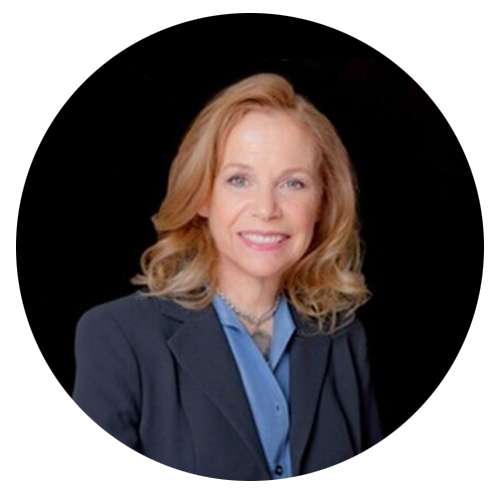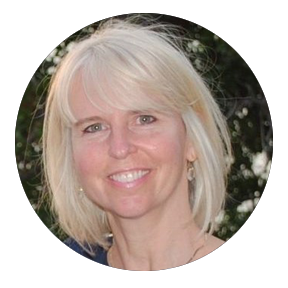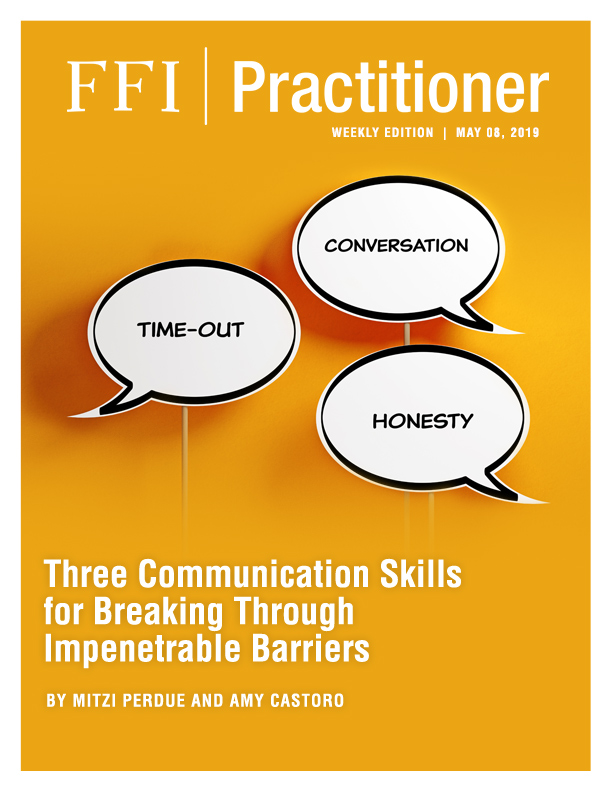Three Communication Skills for Breaking Through Impenetrable Barriers

How can family advisors help their clients when they are so enmeshed in conflict that they seem to have erected impenetrable barriers? According to this week’s contributors, Mitzi Perdue and Amy Castoro, advisors can utilize three communication techniques to break down these barriers and address the underlying causes of the conflict. Mitzi and Amy have illustrated these techniques with an instructive case study that can be shared with clients.
Let’s say the family you’re consulting with can barely stand each other. Family holidays together are a thing of the past. Family vacations? Forget it.
Are there tools you can use to help? Ones that maybe you haven’t tried?
For an answer, let’s take a look at the Brooks family. We made them up, but their situation is very real.
What Should Have Been Easy Street
The Brooks family should have been coasting along on Easy Street. Arnold Brooks had amassed a $50 million fortune in real estate.
He has three daughters, and with his vast wealth, he was able to send them to the best schools and they easily mingled in high society. He even bought each of them multi-million-dollar houses in the nicest section of town.
Everyone agrees that the daughters, now in their 30s, are pleasant, productive, good people. What could go wrong?
The Monthly Walk of Shame
The daughters worked in jobs that didn’t enable them to support their large houses or expensive high-society life-style. Since two were teachers and one ran a non-profit, none of them had salaries that could cover their monthly expenses.
As a result, each month each daughter had to go to her father to ask for more money. Over the years, the experience for both father and daughters went from embarrassing to excruciating.
“His wealth was enabling his daughters to continue the lifestyle they had grown up with while still having the purpose-driven life that they craved.”
The daughters privately referred to these monthly meetings as “The Walk of Shame.” One of the daughters admitted, “Dad never says no, but I know he disapproves of me. I feel as if he thinks of me as nothing but a great big sponge.”
Actually, the daughters were right in sensing their father disapproved. “I’m failing as a father,” he told himself, “I’ve raised children who aren’t self-sufficient.”
For years, the situation festered. As regularly happens in situations involving family conflicts, everyone just swept the problem under the rug. But the pile of stuff under the rug was getting bigger and bigger.
The Family Becomes Dysfunctional
Family members had stopped enjoying each other’s company. The daughters began finding excuses to spend less time with their father.
When his daughters didn’t even want to spend holidays with him, Arnold Brooks realized that he had to do something. So… he decided to call in a professional consulting group. Although these companies have various approaches, here are some idea on how we think the consultants might proceed.
Sidebar
by Mitzi Perdue
Reframing the Issue
One of the first things the consultants can do is to help Arnold Brooks reframe the way he looks at his wealth. It may take many deep and searching conversations to get to a successful reframing, but the essence is that the father had been operating under the expectation that his job as Dad was to teach his kids how to become self-sufficient.
Under a consultant’s guidance, Brooks could come to the realization that self-sufficiency wasn’t what he wanted for his girls. What he wanted most was for each of them to have a rewarding life.
He could come to understand that if his daughters wanted to contribute to the world through careers in teaching and philanthropy, then as their father, he would be in an exceptionally fortunate position. His wealth would enable his daughters to continue the lifestyle they had grown up with while still having the purpose-driven life that they craved.
The daughters would also benefit from improved communications. For a start, they might learn not to sweep problems under the rug, but instead to have authentic communication, including conversations that are uncomfortable. For example, one daughter might be able to tell her father, “I can’t seem to get your approval, and your disapproval is hard for me to bear.”
Another could tell him, “I feel you put me in a bind because you’ve set me up with an extravagant lifestyle, and then you’re critical when my teacher’s salary doesn’t cover my costs.”
“Communication is a skill, and to do it well requires tools and practice.”
The conversations between Arnold Brooks and his daughters might be at times uncomfortable but in the end, everyone will understand each other better and not be compelled to squash their feelings — to finally be able to be authentic, real people, and to enjoy each other’s company.
Here are three communications skill that we recommend for advisors working with clients where communication is lagging:
- If a conversation is too uncomfortable, allow a 20-minute time-out. “We’re going to agree to stop the conversation, but we will come back in 20 minutes.”
- Having a conversation about the conversation can take the heat off. “When we talk about my expenses, the conversation is one sided. Can we talk about how to have that conversation, so I feel heard?”
- Being honest and in the moment. “This conversation is really hard for me, and it even hurts a bit, but it sure beats the horrible numbness and shutting down I was feeling before, when we weren’t being authentic.”
Communication is a skill, and to do it well requires tools and practice. In the case of the Brooks family, it took one-on-one coaching sessions in addition to multi-day retreats.
Retreats aren’t always comfortable, but the rewards can far exceed the price. Today, the Brooks family is close and supportive and they treasure each other’s company. Good communication tools can do that for a family. It’s not as easy as 1, 2, 3 – but these three skills are a start.


Mitzi Perdue is a businesswoman, professional public speaker, and author of the book, How to Make Your Family Business Last. She is a frequent contributor to FFI Practitioner. She can be reached at Mitzi@MitziPerdue.com.
Amy A. Castoro is President, CEO, and a Senior Family Coach at The Williams Group. Amy has worked with High Net Worth (HNW) families, their businesses, and teams for ten years. Her commitment is to bring awareness of the impact of wealth on families, embed the skills of trust and communication, and build alignment of purpose across generations for the successful transfer of wealth. Amy is a speaker and author of the book, Bridging Generations- Transitioning Family Wealth and Values for a Sustainable Legacy. She can be reached at amy@thewilliamsgroup.org.
For more than fifty years The Williams Group has been teaching high-net-worth (HNW) families to engage in challenging conversations they are avoiding so they can strengthen trust and communication to enable their wealth to unite instead of to divide the family for generations to come.

Mitzi Perdue is a businesswoman, professional public speaker, and author of the book, How to Make Your Family Business Last. She is a frequent contributor to FFI Practitioner. She can be reached at Mitzi@MitziPerdue.com.

Amy A. Castoro is President, CEO, and a Senior Family Coach at The Williams Group. Amy has worked with High Net Worth (HNW) families, their businesses, and teams for ten years. Her commitment is to bring awareness of the impact of wealth on families, embed the skills of trust and communication, and build alignment of purpose across generations for the successful transfer of wealth. Amy is a speaker and author of the book, Bridging Generations- Transitioning Family Wealth and Values for a Sustainable Legacy. She can be reached at amy@thewilliamsgroup.org.
For more than fifty years The Williams Group has been teaching high-net-worth (HNW) families to engage in challenging conversations they are avoiding so they can strengthen trust and communication to enable their wealth to unite instead of to divide the family for generations to come.
Related Article

“Harnessing the Power of Being Heard” by Jane Beddall

